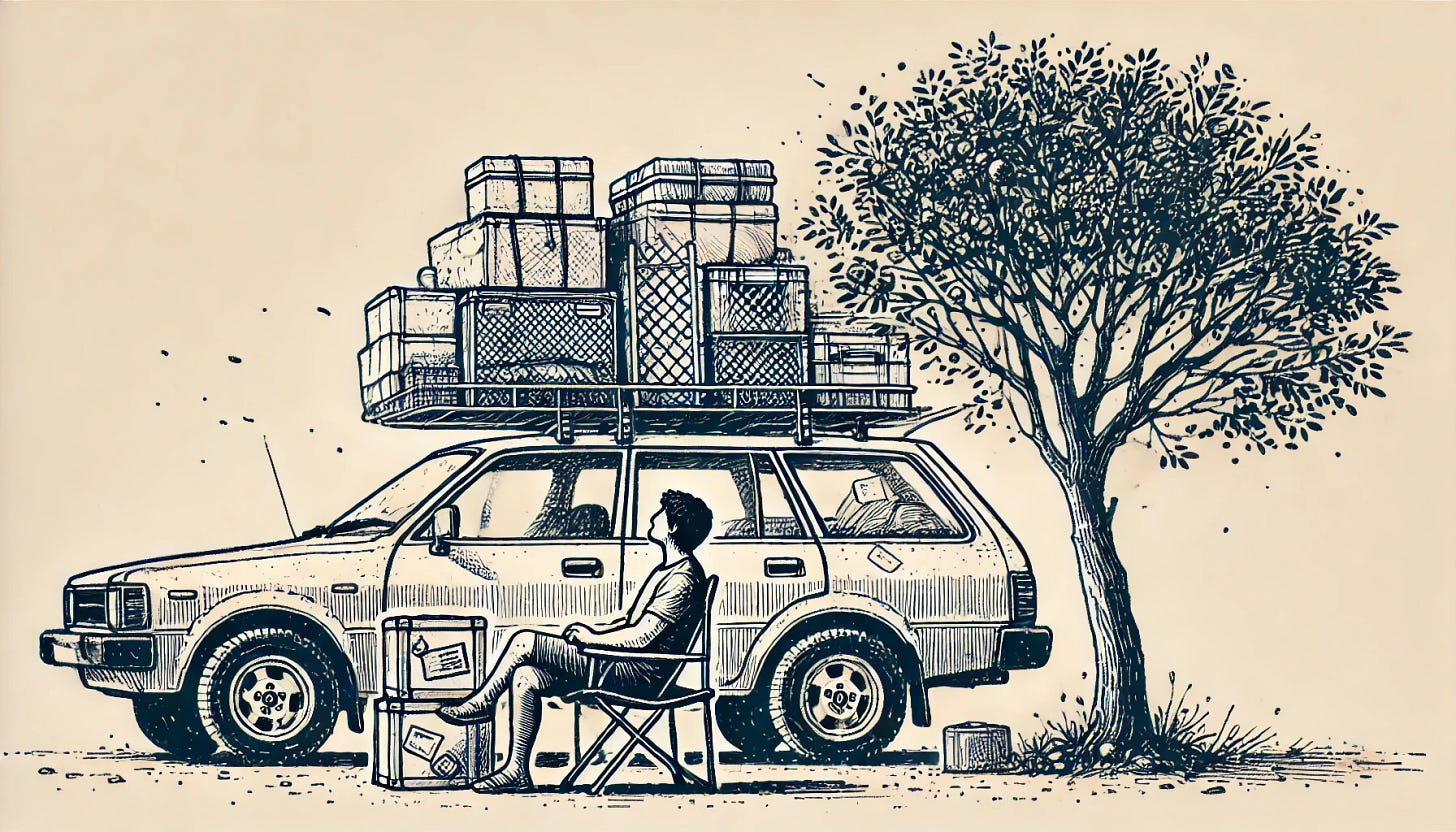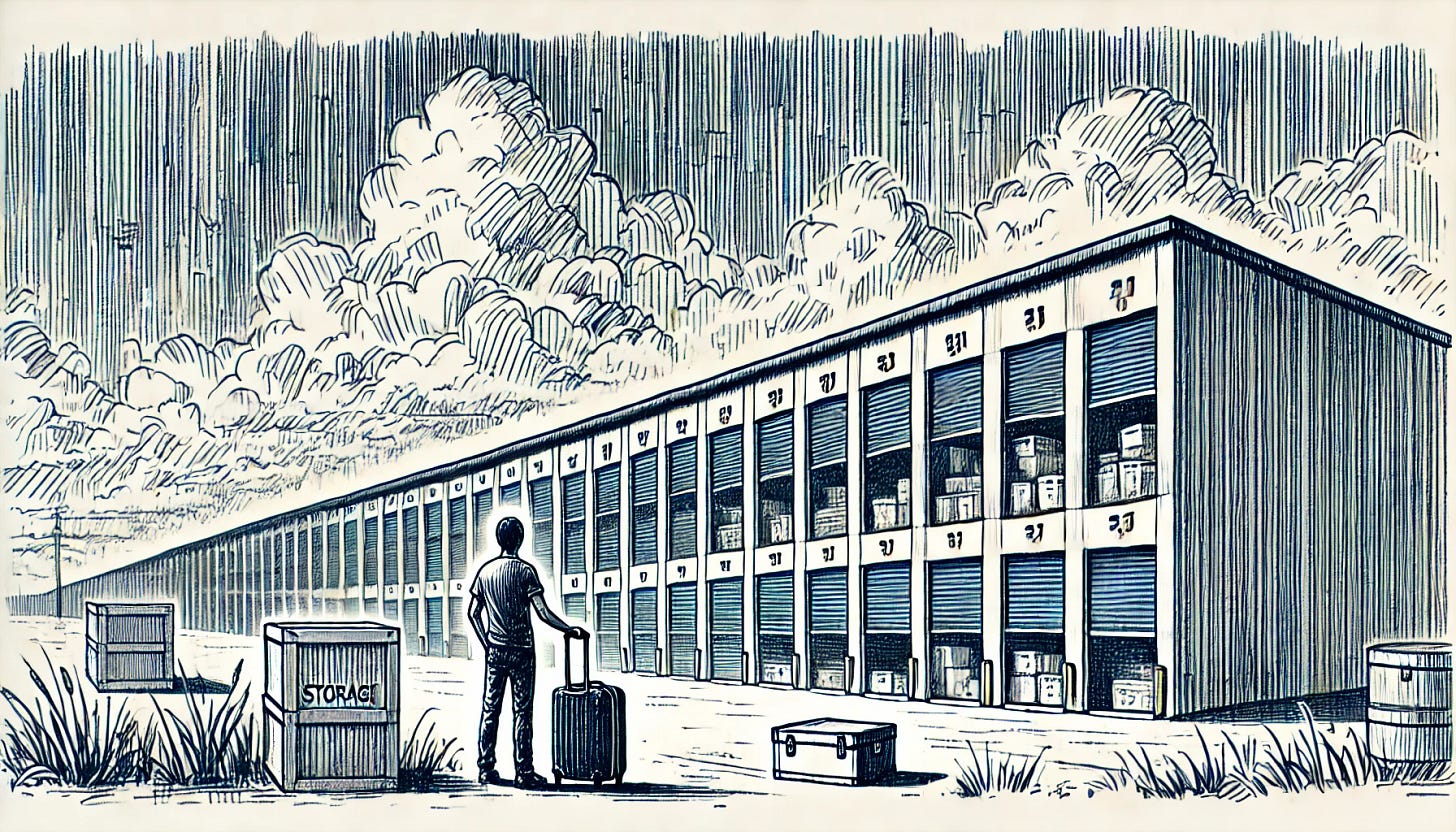Trying to avoid being controlled by what we own
A personal reflection on storage units and collapse.
Right now, the Collapse Life team is living out of suitcases and collapsible crates. All the accumulated items of our lives — the things we’ve collected in the 25 years we’ve spent building memories and preparing for an uncertain future — are currently locked away in a series of climate-controlled storage units. These sanitized, fluorescent-lit closets have become the last refuge for the objects we used to call home. Meanwhile, we’re in housing limbo, living out of the back of a car… well, that’s a bit dramatic — the dogs take up the back of the car, so we tend to all find refuge at the very pet-friendly, very appreciated La Quinta hotels out there in America. But that doesn’t stop us from wondering where we’ll end up next.
It’s unsettling, to say the least. Seeing our possessions stacked and hidden away, inaccessible yet still hauntingly present, is a visceral reminder of just how much control “stuff” can exert. And the irony isn’t lost on us: we write about collapse, about homesteading, about letting go of the consumerist treadmill, and living more simply and sustainably — and yet here we are, surrounded by the ghosts of what we’ve accumulated. Some of those ghosts are heirlooms passed on to us to guard for a future generation we were unable to provide, some of them are strays from previous lives in different parts of the world, and some of them are just plain practical, burdensome reminders of our mooring to Babylon, like old tax files.
A paradox of preparation
One of the strangest parts of this experience is how it clashes with the usual narrative about preparing for collapse. The dominant advice is to stockpile: food, water, tools, supplies, ammo. Be the squirrel preparing for winter. Have enough to last through disruption, to withstand chaos. But instead, Stephen and I are living the opposite. Our lives are stripped down to the bare essentials, reduced to what fits in the back of the car, after the three hounds have piled in. It’s liberating in some ways, but also deeply confounding. How do we reconcile this transient minimalism with the instinct to plan for the future?
The paradox feels like a microcosm of the collapse mindset itself. On one hand, there’s the understanding that too much stuff — too much consumption — is part of the problem. On the other, there’s the instinct to hold on, to cling tightly to the tools and comforts that might one day mean the difference between failure and survival. Storage units amplify this contradiction: they’re places where we try to have it both ways, keeping the excess out of sight but not out of mind.
After selling our home, packing everything we owned into storage was an exercise in both physical and emotional weightlifting. Each box held not just knick-knacks or clothes or books but parts of ourselves. And now, with those parts of ourselves out of reach, there’s a strange void. We’re lighter, yes, but also untethered. It’s hard to say whether the sensation is freedom or loss. Again, an apt metaphor for what collapse feels like.
Living this way has been humbling. It’s shown us just how deeply ingrained consumerism is in our lives, even when we thought we were resisting it. It’s not just the act of buying; it’s the act of keeping, of attaching meaning and security to things. Storage units exist because we’ve built lives that are too big to carry. They’re a symptom of a system that encourages over-accumulation while stripping away stability.
For us, the storage units feel like both a safety net and a trap. They’re a place to hold onto things we might need again — furniture for a new home, tools for future projects — but they’re also a reminder of how fragile those needs are. In a world that’s supposed to be preparing for collapse, what does it mean to have so much stuff you can’t live with it, but also can’t let it go?
If this limbo has taught us anything, it’s the value of living small. There’s a clarity that comes with knowing exactly what you have and where it is. A suitcase doesn’t lie. There’s no space for “just in case” or “someday.” Every item earns its place, which makes you reconsider what’s truly necessary.
But it has also taught us that preparation isn’t about what things you have — it’s about how adaptable you are. It’s about being willing to live with less, to move, to change. The collapse mindset isn’t just bunkering down for a worst-case scenario; it’s learning how to live when everything you thought you needed is inaccessible.
Where do we go from here?
As we navigate this strange chapter of our lives, we’re learning to embrace the uncertainty. The storage units are at once a reminder of what we’ve left behind and of what may lie ahead. They’re also a mental challenge: how much of this will we really need in future? How much is an unnecessary anchor that’s holding us back?
For now, we’ll keep writing, reflecting, and learning. Our storage units might feel like a contradiction, but they’re also part of the story. They’re a mirror, showing us how tightly we’ve clung to a system we’re trying to question. And maybe that’s the lesson we need most right now: to let go, not just of things, but of the idea that things define us.






Interesting that this article came up during a period I was binge watching hoarder cleanout videos. One lady had 16 storage units full. In response to the hoard videos, I have cleaned out my spice cabinet, the cleaning closet, the front hall closet and our clothes closet, taking pathetically few articles to the garbage can or the thrift shop. It is a good exercise to do this now and then. Thanks for the piece. It allowed more reflection on my part and stirred the urge to keep going.
It's a nice article. You may be interested to hear - ordained Buddhist people in the tradition I know were advised, never own more than you can put in a car. Not always practical but I love it as a simple guide. It also makes it less scary when we're having to downsize. We're passing through this life briefly. Why weigh ourselves down with so much stuff? Well done for making such an authentic change.